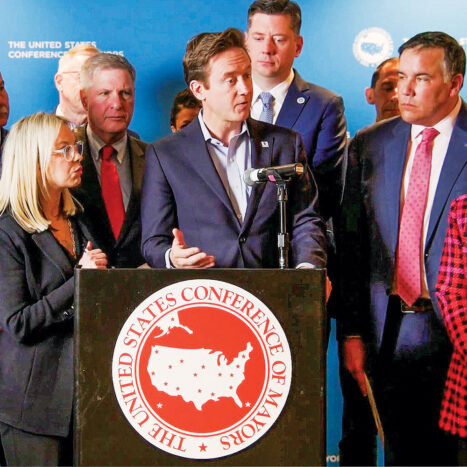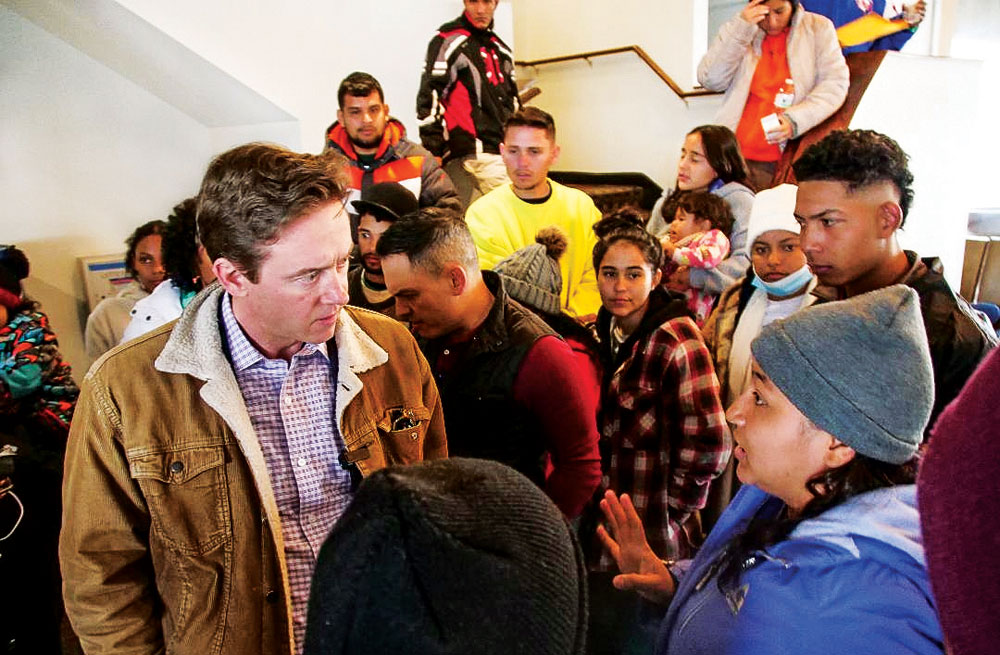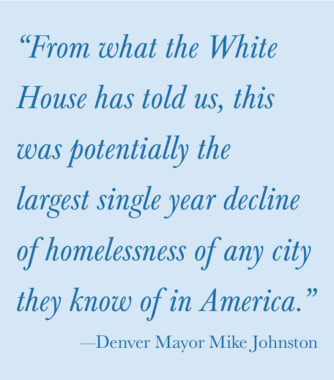
Mayor Mike Johnston and other mayors traveled to Washington D.C. in January to appeal for federal aid and expanded work authorizations for the thousands of migrants that have been arriving in the U.S. Photo courtesy the U.S. Conference of Mayors
It’s been a challenging first six months in office for Mayor Mike Johnston as he launched an ambitious plan to end homelessness, dealt with 40,000 migrants arriving in Denver, tackled rising crime rates, and struggled to find enough money in the budget to pay for it all. Nevertheless, in an interview with Front Porch, Johnston remained upbeat about where the city is headed. “Denver is a place where we just find a way to solve problems, so we will. We will figure it out. And we are figuring it out.”
Migrant Crisis
One of the most complicated challenges has been the arrival of 40,000 migrants—largely from Venezuela—to the City in the past year. Per capita, that’s more than any other city in the country. It is estimated that Denver will have to spend nearly $180 million this year on housing, healthcare, education, transportation, and other costs associated with the migrant crisis. In January, Johnston traveled with other mayors to Washington, D.C. to ask for federal dollars and increased work authorizations for the migrants. He was disappointed to receive just $9 million, which will barely cover about three weeks of expenses.
Johnston blames the collapse of the bipartisan plan to reform immigration. “The federal legislation would have very easily solved this problem. It would have given us the resources we needed. It would have increased work authorizations so people could get to work and support themselves so we wouldn’t need to spend tax dollars to support them.”

Johnston, who is fluent in Spanish, listened to concerns from Venezuelan migrants at the city’s welcoming center in north Denver. Photo courtesy of the Mayor’s Office
Budget Cuts
He says that the inaction by Congress has forced him to announce a first round of city budget cuts. By reducing hours and services at the Denver Motor Vehicle Department and Parks and Recreation Centers, he says the City can save $5 million. For the indefinite future, the Central Park Rec Center will be closed on Fridays, the Hiawatha Davis and MLK Centers will be closed on Sundays, and Lowry’s Montclair Center will be closed on Mondays.
 “The hard truth is that there are many more cuts to come,” says Johnston. “This is maybe one-thirtieth of the cuts we’ll have to make across the city. They’ll be in all different departments in different places with different impacts, but they will not be easy decisions. They will not be fun and they will not be painless.”
“The hard truth is that there are many more cuts to come,” says Johnston. “This is maybe one-thirtieth of the cuts we’ll have to make across the city. They’ll be in all different departments in different places with different impacts, but they will not be easy decisions. They will not be fun and they will not be painless.”
Johnston says the City will also have to cut back on the amount of services that can be offered to the migrants, but he is proud of how so many Denver residents have come forward to help the newcomers. “Yesterday we had a legal clinic, and we had more than 200 volunteers from around the city. People who have taken days off work to come here and help translate or do legal applications or take care of people’s kids while they’re doing work. That is the spirit of Denver. People are pulling together.”
And despite the overwhelming budget challenges facing the city, he is convinced that ultimately Denver will emerge a stronger city. “I think we’ll look back 10-15 years from now and be proud that the city has responded to this crisis with dignity, with humanity, and with a response that I think befits the American spirit, and is one that we’ll be proud of—even if it isn’t easy.”
House1000 Initiative
The other major challenge that Johnston has faced is keeping his campaign promise to move 1,000 people who were living in encampments on city streets into temporary housing by the end of 2023—a goal that he met in the final days of December. According to the City’s dashboard that tracks the House1000 initiative, at press time 1,283 people had been moved into temporary or permanent housing, with only 26 people moving back onto the streets. Johnston is proud of that achievement. “From what the White House has told us, this was potentially the largest single year decline of homelessness of any city they know of in America.”
One of the criticisms that Johnston has received from Northeast Denver residents is that the vast majority of these people are being sheltered in the Central Park neighborhood. According to the city’s dashboard, 537 individuals are living in 2 converted hotels and a micro-community near I-70. Johnston says those sites were filled first because of the “unique opportunity” of available hotel stock near the site of the former Stapleton airport, but he said four other sites are operating and two more are about to open in other parts of the city.
Some residents contend that these Northeast shelters have led to increased crime and they point to a January Denver Police report showing Central Park had the highest rate of crime compared to any other neighborhood, with 399 incidents reported. The next highest neighborhood was Five Points with 346 incidents. Johnston says he wasn’t aware of the report but stated that police patrols have been increased and that residents can call 3-1-1 anytime they are concerned about activity in the area. “We have a direct line that prioritizes any reporting that comes from anywhere in Northeast Denver around these sites.” In addition, he says he personally drives by them “pretty regularly to check in and see how things are going and to talk to business leaders in the neighborhood.”
Perhaps the biggest criticism of the House1000 plan is that it focuses too much on temporary shelter and not enough on finding long-term housing solutions. Johnston says finding affordable housing is his top priority and that his administration has already secured permanent housing for 500 people. Soon, he says, his administration will undertake a “comprehensive, even more ambitious plan to build more units of permanently affordable housing. We will work to bring on 3,000 units this year, and that’s not just for folks that are experiencing homelessness, that is for teachers, and nurses, and firefighters, and retail workers who serve the city and can’t afford to live in the city.”
Johnston says to achieve that goal his administration will have to build new units and convert some existing market-rate housing into affordable housing. “It is a very ambitious task. It’s almost three times what the city has done before.”


0 Comments